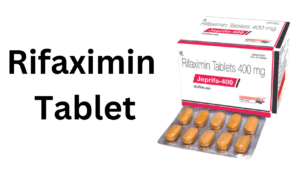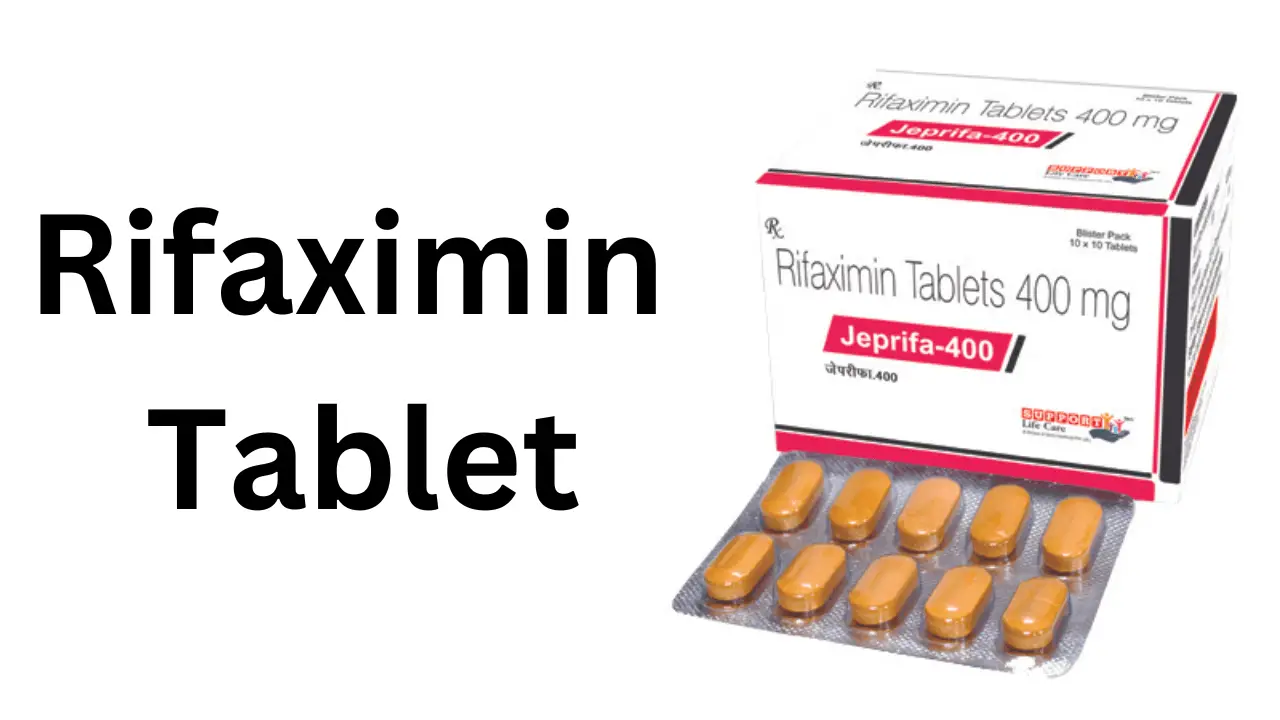Rifaximin Tablet, Advantages, Side Effects
Introduction
Rifaximin is a widely used antibiotic medication that is commonly prescribed for the treatment of various gastrointestinal disorders. In this comprehensive guide, we will explore the benefits, potential side effects, and pricing information related to Rifaximin tablets. Whether you’re a healthcare professional or an individual seeking information about this medication, this article will provide you with a detailed understanding of Rifaximin and its key aspects.
Rifaximin Tablet: What is it?
Rifaximin is an oral antibiotic that belongs to the rifamycin class of drugs. It is primarily used to treat bacterial infections in the gastrointestinal tract. The main active ingredient in Rifaximin tablets is rifaximin itself, which acts by inhibiting the growth of harmful bacteria in the gut.
How does Rifaximin work?
Rifaximin works by targeting and inhibiting the bacterial RNA synthesis process. By doing so, it prevents the replication and growth of bacteria in the intestines. This mechanism of action makes Rifaximin an effective treatment option for various gastrointestinal infections.
Advantages of Rifaximin Tablet
Rifaximin offers several advantages that make it a preferred choice for the treatment of gastrointestinal disorders. Let’s take a closer look at some of its key benefits:
- Targeted action: tablets is specifically designed to act within the gastrointestinal tract, allowing for localized treatment of bacterial infections in this area. This targeted action helps minimize the risk of systemic side effects often associated with other broad-spectrum antibiotics.
- Low absorption: tablets has poor oral bioavailability, meaning it is minimally absorbed into the bloodstream. This characteristic makes it an ideal option for treating infections within the intestines without affecting the rest of the body.
- Minimal drug interactions: tablets has a low likelihood of interacting with other medications, reducing the risk of complications when taken alongside other drugs. However, it is always important to consult with a healthcare professional or pharmacist regarding potential drug interactions.
- Convenience: tablets are usually taken orally and have a simple dosing regimen. This convenience makes it easier for patients to adhere to their prescribed treatment plan.
Side Effects of Rifaximin Tablet
While Rifaximin is generally well-tolerated, like any medication, it can have potential side effects. It is essential to be aware of these possible adverse reactions. It’s important to note that not everyone experiences side effects, and they may vary from person to person. If you experience any concerning symptoms while taking tablets, seek medical attention promptly. Some of the potential side effects of Rifaximin include:
- Nausea and vomiting: These gastrointestinal symptoms are among the most commonly reported side effects of tablets. If these symptoms persist or worsen, it is advisable to consult a healthcare professional.
- Abdominal pain or discomfort: Some individuals may experience mild to moderate abdominal pain or discomfort while taking tablets. If the pain becomes severe or persistent, medical advice should be sought.
- Headache: Headaches are another reported side effect associated with tablets. If the headache persists or becomes severe, it is recommended to consult a healthcare provider.
- Allergic reactions: While rare, some individuals may experience allergic reactions to tablets. Symptoms of an allergic reaction may include rash, itching, swelling, severe dizziness, or difficulty breathing. In case of any allergic reactions, immediate medical attention should be sought.
Price of Rifaximin Tablet
The cost of Rifaximin tablets can vary depending on several factors, including the brand, dosage strength, and the quantity of tablets in each pack. It is advisable to consult with local pharmacies or healthcare providers to obtain accurate pricing information specific to your location. Additionally, various health insurance plans may cover a portion of the cost, so it’s recommended to check with your insurance provider regarding coverage details.

Price: 450 INR Buy Now
The Importance of Consulting a Healthcare Professional
Before starting any new medication, including tablets, it is crucial to consult with a qualified healthcare professional. They will evaluate your medical history, assess your specific condition, and determine the appropriate dosage and duration of treatment. Your healthcare provider can also address any concerns or questions you may have regarding tablets or its potential side effects.
Taking Rifaximin Tablets: Dosage and Administration
The dosage of tablets can vary depending on the specific condition being treated. It is important to follow the prescribed dosage instructions provided by your healthcare professional. tablets are usually taken orally, with or without food, as directed. It is essential to complete the full course of treatment, even if you start feeling better before the prescribed duration.
Possible Interactions with Other Medications
While Rifaximin has a low likelihood of interacting with other medications, it is essential to inform your healthcare provider about all the medications you are currently taking. This includes prescription drugs, over-the-counter medications, and any herbal supplements or vitamins. By disclosing this information, your healthcare provider can ensure there are no potential drug interactions that could affect the effectiveness or safety of tablets.
Frequently Asked Questions (FAQs)
Q1: What conditions can Rifaximin tablets treat?
A1: tablets are commonly prescribed for the treatment of conditions such as traveler’s diarrhea, irritable bowel syndrome with diarrhea (IBS-D), and hepatic encephalopathy (a liver disease-related condition).
Q2: Can Rifaximin be taken during pregnancy?
A2: It is important to consult with a healthcare professional before taking any medications during pregnancy. They will assess the potential risks and benefits and make an informed decision based on your specific situation.
Q3: Are there any dietary restrictions while taking Rifaximin?
A3: tablets can be taken with or without food, as it does not require any specific dietary restrictions. However, it is advisable to follow your healthcare provider’s instructions regarding the administration of the medication.
Q4: How long does it take for Rifaximin to start working?
A4: The onset of action of tablets may vary depending on the condition being treated. It is important to follow the prescribed treatment duration and consult with your healthcare provider regarding any concerns about the effectiveness of the medication.
Q5: Can Rifaximin cause drug interactions?
A5: While tablets has a low likelihood of interacting with other medications, it is always advisable to inform your healthcare provider about any other medications you are taking to ensure there are no potential interactions.
Q6: Can Rifaximin be given to children?
A6: tablets may be prescribed to children under certain circumstances. However, the dosage and duration of treatment should be determined by a healthcare professional based on the child’s age, weight, and specific condition.
Conclusion
Rifaximin tablets offer a targeted and effective treatment option for various gastrointestinal infections. With its localized action and minimal absorption, Rifaximin provides advantages such as reduced systemic side effects and convenience in administration. However, it’s essential to be aware of potential side effects and consult with healthcare professionals for accurate pricing and personalized medical advice.
Remember, this article serves as a guide and does not replace professional medical advice. If you have any concerns or questions about tablets or any other medications, always consult with a qualified healthcare provider.
DISCLAIMER
The information provided on this blog regarding medicine prices and side effects is solely based on data collected from public domains. I am not a doctor or medical professional. While I strive to provide accurate and up-to-date information, I cannot guarantee the absolute accuracy or completeness of the data. It is always recommended to consult with a qualified healthcare professional or doctor for personalized medical advice and information. The content on this blog should not be considered a substitute for professional medical guidance. The readers are advised to use the information provided at their own discretion and risk. I do not assume any responsibility for any consequences arising from the use of the information on this blog.
